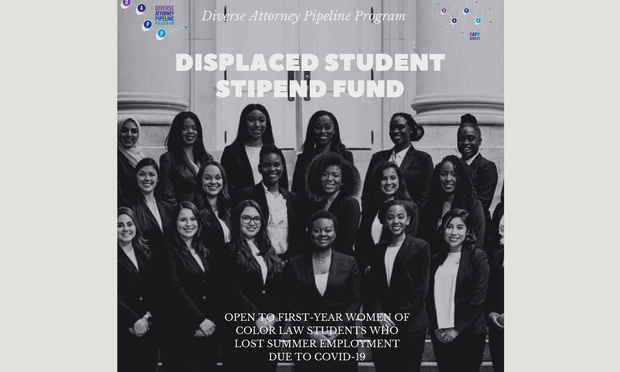Nonprofit Cites Special Risks for Diverse Law Students in Plea for Pandemic Support
The Diverse Attorney Pipeline Program will award up to $5,000 to women of color law students who have lost their first-year internships at a law firm or a company during the COVID-19 crisis.
June 03, 2020 at 05:45 PM
5 minute read
 (Courtesy of Diverse Attorney Pipeline Program)
(Courtesy of Diverse Attorney Pipeline Program)
A Chicago nonprofit that helps women law students of color get their feet in the door at law firms is looking to financially support students across the country who have lost their summer internships.
Summer internships at law firms are a critical source of funding for these students, said Tiffany Harper and Chasity Boyce, co-founders of the Diverse Attorney Pipeline Program. DAPP is looking to raise at least $100,000 to fill this gap, they said.
"We don't want people to have to leave school because they were displaced somewhere and they don't have a way to fund themselves," said Harper, who serves as first deputy treasurer and chief of staff for the city of Chicago.
DAPP's Displaced Student Stipend Fund and Fellowship will award up to $5,000 to law student women of color who have lost their first-year internships at a law firm or a company due to the ongoing COVID-19 pandemic. The program will also pair students with lawyers, who will act as mentors and help train the students to become lawyers.
"The 1L summer is critically important to what opportunities students have when they graduate law school," said Boyce, who said the goal of the program is to help women law students of color become "the most marketable they can be." Boyce is the vice president, head of inclusion and diversity at Heitman, a real estate investment management firm.
A number of law firms have canceled their summer associate and 1L internship programs in reaction to the COVID-19 pandemic. Some firms have promised to pay students anyway or offer them jobs after graduation. But not all.
Earlier this month, the Georgia Latino Law Foundation launched a five-week virtual judicial internship program for second-year students whose summer associate programs were also canceled.
DAPP began accepting applications for the program on May 26, a day after George Floyd's death in the custody of Minneapolis police officers. The country has been gripped by protests against police brutality and racial injustice, but even absent those events, the urgency to bolster the number of women of color practicing law remains the same, Harper said.
"I think we have the same urgency as before because systemic racism has always had an impact on diversity and inclusion in the legal profession," she said. "There are many barriers to advancement for women of color lawyers that come out of the same racism that protesters are fighting against."
Harper and Boyce graduated from law school in 2008 and 2009, respectively, at the height of the Great Recession. The measures the U.S. legal industry took then to weather the economic fallout greatly affected lawyers of color. In 2019, the percentage of black or African American law associates working in large law firms finally—and barely—surpassed its 2009 level, according to a 2019 study from the National Association of Legal Placement.
That same study found that "the overall arc of the storyline for large law firm diversity remains the same—it is one of slow incremental gains for women and people of color in both the associate and partnership ranks, interrupted by some recession-era setbacks, but at a rate so slow as to almost seem imperceptible at times."
Harper and Boyce are hoping to avoid a repeat of the past. DAPP has already seeded the fund with $20,000 of its own money, Boyce said. The group is hoping to raise more money from law firms, bar associations, companies and other groups. But they acknowledged it's a tough ask to make at a time when law firms are cutting salaries and partner distributions, and furloughing or laying off lawyers and staff, in order to preserve their own liquidity.
"I definitely think I'm worried," Harper said. "We might have people who just can't do it. Our hope is some people stretch a little bit and remember what happened in '09. We lost so much progress that we had made in the legal profession. It doesn't take much to fund something like this."
Apart from its seed money, DAPP has raised another $5,000 or so and has received commitments from other organizations, Harper said. DAPP is accepting applications for the program through June 12. DAPP separately offers a yearlong program for first-year women law students of color at Chicago-area law schools. But the organization's Displaced Student Stipend Fund and Fellowship is available to women of color in their first year of law school across the country, Boyce said.
DAPP has received 50 applications so far. Harper said she was flooded with messages and emails from law students asking about the program without having done any real outreach besides posting information on social media.
"I have to assume there's a great need out there," Harper said.
Read More
Summer Associate Programs and COVID-19: How Law Firms Are Responding
Is a 2-Week Summer Associate Program Even Worth It? Kirkland Isn't the Only Firm That Thinks So
From Canceled to 'Business as Usual,' Law Firms Go Their Own Way on Summer Associate Programs
'It Could Have Been Me': Black Attorneys Reflect on George Floyd's Death and What Comes Next
'Things Are Different Now': General Counsel, Corporations React Publicly to George Floyd's Death
This content has been archived. It is available through our partners, LexisNexis® and Bloomberg Law.
To view this content, please continue to their sites.
Not a Lexis Subscriber?
Subscribe Now
Not a Bloomberg Law Subscriber?
Subscribe Now
NOT FOR REPRINT
© 2025 ALM Global, LLC, All Rights Reserved. Request academic re-use from www.copyright.com. All other uses, submit a request to [email protected]. For more information visit Asset & Logo Licensing.
You Might Like
View All

Treasury GC Returns to Davis Polk to Co-Chair White-Collar Defense and Investigations Practice
2 minute read
Kirkland & Ellis Taps Former Co-Chair of Greenberg Traurig’s Digital Infrastructure Practice
3 minute read
Trending Stories
- 1Is It Time for Large UK Law Firms to Begin Taking Private Equity Investment?
- 2Federal Judge Pauses Trump Funding Freeze as Democratic AGs Launch Defensive Measure
- 3Class Action Litigator Tapped to Lead Shook, Hardy & Bacon's Houston Office
- 4Arizona Supreme Court Presses Pause on KPMG's Bid to Deliver Legal Services
- 5Bill Would Consolidate Antitrust Enforcement Under DOJ
Who Got The Work
J. Brugh Lower of Gibbons has entered an appearance for industrial equipment supplier Devco Corporation in a pending trademark infringement lawsuit. The suit, accusing the defendant of selling knock-off Graco products, was filed Dec. 18 in New Jersey District Court by Rivkin Radler on behalf of Graco Inc. and Graco Minnesota. The case, assigned to U.S. District Judge Zahid N. Quraishi, is 3:24-cv-11294, Graco Inc. et al v. Devco Corporation.
Who Got The Work
Rebecca Maller-Stein and Kent A. Yalowitz of Arnold & Porter Kaye Scholer have entered their appearances for Hanaco Venture Capital and its executives, Lior Prosor and David Frankel, in a pending securities lawsuit. The action, filed on Dec. 24 in New York Southern District Court by Zell, Aron & Co. on behalf of Goldeneye Advisors, accuses the defendants of negligently and fraudulently managing the plaintiff's $1 million investment. The case, assigned to U.S. District Judge Vernon S. Broderick, is 1:24-cv-09918, Goldeneye Advisors, LLC v. Hanaco Venture Capital, Ltd. et al.
Who Got The Work
Attorneys from A&O Shearman has stepped in as defense counsel for Toronto-Dominion Bank and other defendants in a pending securities class action. The suit, filed Dec. 11 in New York Southern District Court by Bleichmar Fonti & Auld, accuses the defendants of concealing the bank's 'pervasive' deficiencies in regards to its compliance with the Bank Secrecy Act and the quality of its anti-money laundering controls. The case, assigned to U.S. District Judge Arun Subramanian, is 1:24-cv-09445, Gonzalez v. The Toronto-Dominion Bank et al.
Who Got The Work
Crown Castle International, a Pennsylvania company providing shared communications infrastructure, has turned to Luke D. Wolf of Gordon Rees Scully Mansukhani to fend off a pending breach-of-contract lawsuit. The court action, filed Nov. 25 in Michigan Eastern District Court by Hooper Hathaway PC on behalf of The Town Residences LLC, accuses Crown Castle of failing to transfer approximately $30,000 in utility payments from T-Mobile in breach of a roof-top lease and assignment agreement. The case, assigned to U.S. District Judge Susan K. Declercq, is 2:24-cv-13131, The Town Residences LLC v. T-Mobile US, Inc. et al.
Who Got The Work
Wilfred P. Coronato and Daniel M. Schwartz of McCarter & English have stepped in as defense counsel to Electrolux Home Products Inc. in a pending product liability lawsuit. The court action, filed Nov. 26 in New York Eastern District Court by Poulos Lopiccolo PC and Nagel Rice LLP on behalf of David Stern, alleges that the defendant's refrigerators’ drawers and shelving repeatedly break and fall apart within months after purchase. The case, assigned to U.S. District Judge Joan M. Azrack, is 2:24-cv-08204, Stern v. Electrolux Home Products, Inc.
Featured Firms
Law Offices of Gary Martin Hays & Associates, P.C.
(470) 294-1674
Law Offices of Mark E. Salomone
(857) 444-6468
Smith & Hassler
(713) 739-1250










